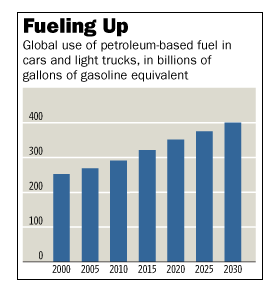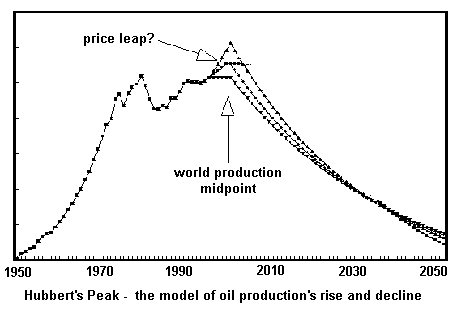| |
Running Out Of Oil Versus Running Out of Cheap Oil
(May 24, 2006)
 The Atlantic's senior editor Clive Crook summarized the Standard Line on oil
and energy very succinctly in the June issue:
The Atlantic's senior editor Clive Crook summarized the Standard Line on oil
and energy very succinctly in the June issue:
Much of the rhetoric about oil is overheated.
The world is not running out of the stuff. With present technologies, proven and probable
reserves of oil wil be sufficient for decades ... an array of existing but not widely
applied technologies would make it economically feasible to extract oil from tar sands or shale,
or to convert coal to liquid fuel.
While Mr. Crook reaches the right conclusions in his piece, "Shock Absorption"--
he calls for energy diversification and a long-term "fix" to global warming--his grasp of
petroleum realities is weak. To wit: virtually the entire substance of the above quote is
utter nonsense.
While Mr. Crook is no doubt a very smart guy, and his long-term view is worthy, he obviously didn't bother reading anything of
value about the oil industry before he penned his breezy opinions.
The realities are rather different than his opinions:
Only one barrel of oil is being discovered for every two being extracted--and that's been the
case since the late 60s. It doesn't take any special genius to grasp that if extraction
exceeds new discoveries, at some point the amount of oil being extracted will begin dropping.
That is the basis of "Hubbert's Peak" (see chart below).
Proven reserves are largely guesswork and easily manipulated for political or financial
reasons. The Saudi reserves, for
instance, have never declined, no matter how many billions of barrels have been pumped--at
least according to their "official numbers." This beggars the imagination, but people like
Mr. Crook are glad to accept what simply cannot be. For a detailed, exhaustive and
very persuasive account of how little cheap oil remains in Saudi Arabia, see
Twilight in the Desert: The Coming Saudi Oil Shock and the World Economy It is incomprehensible that Mr. Crook has no knowledge of the large body of evidence which
suggests "proven reserves" have approximately the same reality as Aladdin's Magic Lamp.
It is incomprehensible that Mr. Crook has no knowledge of the large body of evidence which
suggests "proven reserves" have approximately the same reality as Aladdin's Magic Lamp.
At best, perhaps one-half of a petroleum field's oil can be extracted at low cost. The
other half, or even two-thirds, is accessible only if you employ highly expensive technologies
such as superheated steam being pumped down two miles deep to "soften" the sludgy oil which
remains after the "light sweet" oil has been pumped.
How expensive? When you first tap a well, the oil is often under pressure, so it gushes
out all by itself. The estimated cost of extracting such "light sweet crude" oil in these initial conditions is $1
a barrel. Once you start having to pump steam or carbon dioxide deep into a well and then
pump the loosened sludge to the surface and refine this "heavy oil", the cost is more on the
order of $40 to $50 a barrel--50 times more expensive that the "light sweet crude" you
extracted so easily at the start.
Up to a third of the oil left in a field can never be extracted. Oil doesn't sit in a big
lake two or three miles' deep; it is a semi-liquid goo permeating porous rock, like water in a
sponge. Not only that, but the field is irregular and only 6 feet thick; think patchy
rock-hard thin sponge which extends miles underground in meandering extensions.
"...but not widely applied technologies..." Apparently Mr. Crook did not bother to even
call up any photos of the tar sands in Alberta, Canada. Not widely applied? Is he kidding?
Huge trucks the size of McMansions are scooping up square miles of tar sands and hauling them
to boomtowns to be extracted in horrendously costly and environmentally suspect plants
which spew millions of gallons of waste water and millions of tons of gooey sand as "by-products."
The maximum production capacity of the Canadian oil shale fields is estimated to be 5 million
barrels a day, period, due to the extreme difficulties in mining, transporting, refining
and disposing of the waste created by the mining process. The Canadians have a somewhat
understandable desire to use some of their own oil, and the Chinese have spoken for
about 2 million barrels a day, so that leaves the U.S. with perhaps 2 million barrels a day,
period. Since we consume 21 million barrels a day, that only leaves 19 million barrels a day
to find, pump, refine and transport to our markets every day from somewhere else. Any ideas
on where that might come from, Mr. Crook, or does your fantasy conveniently leave Venezuela
and the Mideast out of the picture?
Mr. Crook seems unaware of the fact that processing the sludgy tar sand
consumes vast quanities of natural gas. You have to burn the equivalent of 1 barrel
of oil in order to extract 2 barrels of oil from tons and tons of toxic tar sand. If you run
short of natural gas, or choose to expend that precious resource on heating and cooking,
well, your tar sands cannot be turned into gasoline. In sum: Mr. Crook's
ignorance of the practical limits on turning coal and tar sands into gasoline or jet fuel
seemingly knows no bounds.
That hideous inefficiency looks good compared to the even more hideously inefficiencies
of turning corn into ethanol--another "solution" to our "oil addiction" hyped by either the
ignorant or the duplicious. It takes 1 barrel of oil to manufacture 1.3 barrels of ethanol--a
total energy gain of 30%. And even that number is disputed as too high (do a web search
if you want to learn more.)
All the supergiant oil fields in existence have already been discovered. Yes, it's a fact.
The entire globe has already been scouted for decades. All the last big fields were discovered
in the late 60s or early 70s--the North Sea, Alaska, you name it. And after 30 years of
production, those fields are being depleted; every year, they pump fewer barrels of oil.
Oil doesn't just form anywhere; it only forms under highly specific and rare circumstances.
All the likely spots, and even the unlikely spots, have been thoroughly explored. Sorry,
Mr. Crook, but I suggest you speak with some oil geologists before positing an oil supply
which will last for decades to come, despite ever-rising demand and ever-shrinking output.
Let's say you have a billion barrels of oil in one reserve and another billion that's
spread out in a thousand smaller fields. It's the same quantity of oil on the "proven
reserves" ledger, but how much will
it cost to drill, pump, gather and refine dribbles of oil from a thousand wells? That's the
other problem with "proven reserves." Only the supergiant fields are easily pumped, but
a significant quantity of the world's remaining oil (that Mr. Crook so glibly assumes will be available to
fill the tanks of 200 million American vehicles) is buried deep in small fields--fields of
a few million barrels of oil. The hole you need to drill to reach it is just as expensive as the hole you
drilled to reach a billion barrels, and the small wells need to be connected via very expensive
pipelines to a central location.
Much of the oil remaining in Saudi Arabia and elsewhere is heavy, sulfur-laden oil which
is costly to refine.
The processes Mr. Crook so serenely depends on--gasifying dirty, low-energy coal and
digging up much of Alberta Province--create massive amounts of the greenhouse gases he
suggests we really, really should start controlling. Talk about contradictory nonsense--it doesn't
get any more extreme than this, folks.
Does Mr.Crook have even the slightest notion of how difficult/costly it is to scrub carbon
dioxide out of gasified coal, or heat-treated shale-oil? Does he have any grasp of the environmental
damage and risks inherent in mining the tons of coal needed to produce a mere
21 million barrels of refined oil products--what the U.S. burns each and every day?

I could go on, but I'm getting tired of typing the almost limitless errors behind Mr. Crook's
blithe opinions.
Better for you to read
Beyond Oil: The View from Hubbert's Peak.
What Mr. Crook fails to divulge is that the global economy has been relying not only on oil
per se, but on extremely cheap-to-pump-and-refine oil, the oil which has gushed unbidden from
a handful of supergiant fields which are rapidly being depleted. Yes, there is "plenty
of oil in the ground," Mr. Crook, but much of it cannot be extracted, and the rest can only
be extracted at great expense. While Mr. Crook is pleased to note that the U.S. economy has
withstood the effects of $50/barrel oil with no ill effects (or at least none that are
visible in "official" statistics), does his hubris extend to $100/barrel or even $200/barrel
oil? You know, the kind that's still left in the ground? Mr. Crook's ignorance is not just
stupendously absymal, it is willful and therefore inexcusable in the age of the Web search.
I also wonder if Mr. Crook would be so smarmily confident in the ease with which oil will
flow to the tanks of airliners and vehicles if he lived in, say, West Virginia, near the coal strip mines he so
cheerily assumes will provide him with gasoline, or the square miles of Canadian tundra being torn up
and destroyed for his "economical" tar-sands oil "fix." I am rather confident that Mr.Crook resides in
the safe and clean cocoon of the Upper West Side or an equivalent haven of the well-heeled--the
very population who would not be too bothered by high energy costs.
Sadly, Mr. Crook printed his utterly irresponsible opinions without the slightest shred
of research or knowledge. Too bad he wasted such a widely read media forum for
unsupported rubbish which only furthers the American public's profound ignorance of the
energy complex which fuels their soon-to-be-very-expensive lifestyle.
For more on this subject and a wide array of other topics, please visit
my weblog.
copyright © 2006 Charles Hugh Smith. All rights reserved in all media.
I would be honored if you linked this wEssay to your site, or printed a copy for your own use.
|
|


 The Atlantic's senior editor Clive Crook summarized the Standard Line on oil
and energy very succinctly in the June issue:
The Atlantic's senior editor Clive Crook summarized the Standard Line on oil
and energy very succinctly in the June issue:
